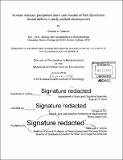| dc.contributor.advisor | Mriganka Sur. | en_US |
| dc.contributor.author | Feldman, Danielle A. (Danielle Anagela) | en_US |
| dc.contributor.other | Massachusetts Institute of Technology. Department of Brain and Cognitive Sciences. | en_US |
| dc.date.accessioned | 2017-04-05T16:00:54Z | |
| dc.date.available | 2017-04-05T16:00:54Z | |
| dc.date.copyright | 2016 | en_US |
| dc.date.issued | 2016 | en_US |
| dc.identifier.uri | http://hdl.handle.net/1721.1/107869 | |
| dc.description | Thesis: Ph. D., Massachusetts Institute of Technology, Department of Brain and Cognitive Sciences, 2016. | en_US |
| dc.description | Cataloged from PDF version of thesis. | en_US |
| dc.description | Includes bibliographical references. | en_US |
| dc.description.abstract | Rett Syndrome (RTT) is a pervasive, X-linked neurodevelopmental disorder that predominantly affects girls. The clinical patient features of RTT are most commonly reported to emerge between the ages of 6-18 months and as such, RTT has largely been considered to be a postnatal disorder. The vast majority of cases are caused by sporadic mutations in the gene encoding methyl CpG-binding protein 2 (MeCP2), which is expressed in the brain during prenatal neurogenesis and continuously throughout adulthood. MeCP2 is a pleiotropic gene that functions as a complex, high-level transcriptional modulator. It both regulates and is regulated by coding genes and non-coding RNAs including microRNAs (miRNAs). The effects of MeCP2 are mediated by diverse signaling, transcriptional, and epigenetic mechanisms. Whereas the postnatal effects of MeCP2 have been widely studied, pre-symptomatic stages of RTT have yet to be thoroughly investigated. Recent evidence from our lab among others suggests a role for MeCP2 during prenatal neurogenesis that may contribute to the neuropathology observed later in life. We sought to characterize the course of neurogenesis in MeCP2-deficient human neurons with the use of induced pluripotent stem cells (iPSCs) derived from RTT patient skin samples. We generated a variety of monolayer and 3D neuronal models and found that RTT phenotypes are present at the earliest stages of brain development including neuroepithelial expansion, neural progenitor migration and differentiation, and later stages of membrane and synaptic physiological development. We established a link between MeCP2 and key microRNAs that are misregulated in RTT and lie upstream of signalling pathways that contribute to aberrant neuronal maturation in the absence of MeCP2. We have uncovered novel roles of MeCP2 in human neurogenesis. Whereas the processes that comprise early neural development were previously considered irrelevant to RTT pathology, the deficits we observed in neuronal differentiation, migration, and maturation are a crucial component to the larger picture of RTT pathogenesis and provide additional insight into the emergence of RTT patient symptoms. | en_US |
| dc.description.statementofresponsibility | by Danielle A. Feldman. | en_US |
| dc.format.extent | 210 pages | en_US |
| dc.language.iso | eng | en_US |
| dc.publisher | Massachusetts Institute of Technology | en_US |
| dc.rights | MIT theses are protected by copyright. They may be viewed, downloaded, or printed from this source but further reproduction or distribution in any format is prohibited without written permission. | en_US |
| dc.rights.uri | http://dspace.mit.edu/handle/1721.1/7582 | en_US |
| dc.subject | Brain and Cognitive Sciences. | en_US |
| dc.title | Human induced pluripotent stem cell models of Rett Syndrome reveal deficits in early cortical development | en_US |
| dc.type | Thesis | en_US |
| dc.description.degree | Ph. D. | en_US |
| dc.contributor.department | Massachusetts Institute of Technology. Department of Brain and Cognitive Sciences | |
| dc.identifier.oclc | 976402627 | en_US |
